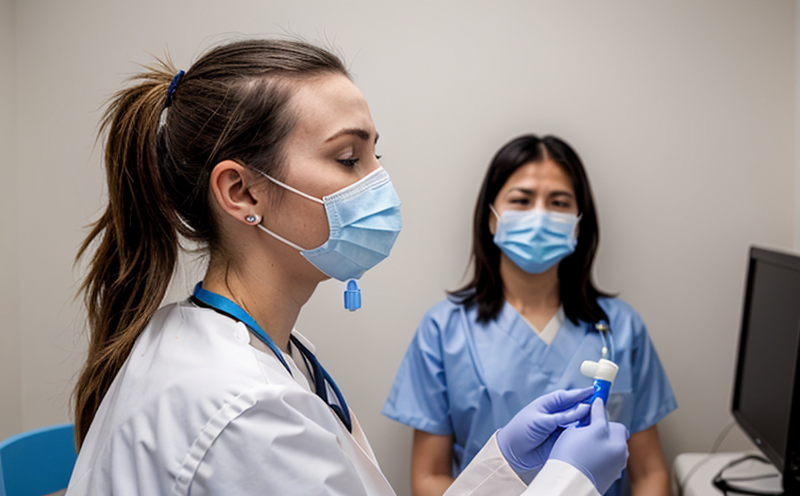Airborne Mycobacteria Testing in Dairy Processing Facilities
The presence of airborne mycobacteria poses significant challenges to dairy processing facilities. These bacteria can lead to contamination issues that not only affect product quality but also pose health risks for consumers, employees, and the surrounding community. This service is designed specifically to address these concerns by providing comprehensive testing solutions tailored to the unique conditions found in dairy processing environments.
Our airborne mycobacteria testing protocol follows established international standards such as ISO 14698-3:2015 for cleanroom microbiology and EN 14686 for indoor air quality. This ensures that the tests conducted are both accurate and reliable, providing a solid foundation for decision-making processes within your facility.
The testing process begins with thorough sampling of air samples using specialized equipment designed to capture viable airborne microorganisms effectively. Specimen preparation involves precise dilution techniques followed by plating onto appropriate media suitable for mycobacteria growth, such as Middlebrook 7H10 agar supplemented with glycerol and oleic acid.
Once colonies form on the plates after incubation periods ranging from two to six weeks depending on species identification requirements, they are examined under microscopy for characteristic morphological features typical of mycobacterial genera. Identification may further require biochemical tests or molecular techniques like PCR (Polymerase Chain Reaction) targeting specific genetic markers associated with various types of mycobacteria.
The results provide detailed information about the presence and concentration levels of different species of airborne mycobacteria present in your facility’s environment. This data can be used to assess current hygiene standards, evaluate control measures effectiveness, and identify potential sources of contamination so corrective actions can be implemented promptly.
Our team works closely with clients throughout all stages of this process from initial consultation through final report delivery ensuring full transparency and understanding regarding our findings and recommendations. By partnering with us on airborne mycobacteria testing in dairy processing facilities, you gain access to state-of-the-art methodologies supported by experienced professionals committed to maintaining the highest levels of accuracy and reliability.
This service plays a crucial role in safeguarding public health while enhancing operational efficiency within dairy processing plants. It helps ensure that products meet stringent quality standards set forth by regulatory bodies worldwide, thereby protecting both consumers and employees alike from potential risks associated with airborne mycobacteria contamination.
Scope and Methodology
The scope of our airborne mycobacteria testing in dairy processing facilities encompasses a wide range of activities aimed at identifying and quantifying specific species of mycobacteria present in the air. The methodology employed adheres strictly to recognized international standards, ensuring consistency and accuracy across all tests conducted.
Sampling is performed using advanced filtration systems capable of capturing even small particles containing viable microorganisms. Once collected, these samples undergo rigorous processing including preservation methods designed to maintain sample integrity until analysis can be carried out.
The identification phase involves multiple steps starting with colony morphology observation under light microscopy followed by selective growth on specialized media. Biochemical reactions performed on isolated colonies help narrow down possible identities further. For definitive species determination, molecular biology approaches like PCR might also be utilized depending upon complexity and specificity needed for accurate classification.
Quantitative aspects include determining the number of cfu (colony-forming units) per cubic meter of air sampled. This metric provides critical insights into potential exposure levels faced by personnel working in these facilities as well as any necessary adjustments required to achieve compliance with relevant guidelines.
Industry Applications
In the dairy processing industry, maintaining high standards of hygiene and ensuring product safety is paramount. Airborne mycobacteria testing plays an integral part in achieving this goal by providing valuable insights into environmental conditions that could impact milk quality and public health.
For instance, understanding the types and concentrations of airborne mycobacteria allows for targeted interventions aimed at reducing contamination risks throughout production processes. These measures may include improved ventilation systems, enhanced cleaning protocols, or changes to raw material sourcing practices based on test results obtained during our services.
Dairy plants often experience frequent fluctuations in temperature and humidity which can influence the survival and proliferation of mycobacteria in indoor environments. By monitoring these variables alongside microbial counts, managers gain deeper knowledge about optimal operating parameters needed to minimize risk factors associated with airborne bacteria contamination.
Moreover, regulatory compliance is another key application area for our testing services. Regulatory bodies around the world impose strict requirements regarding air quality and pathogen detection within food processing facilities. Our tests help dairy operators demonstrate adherence to these standards through objective data derived from reliable methods.
Quality and Reliability Assurance
To ensure the highest level of accuracy and reliability in our airborne mycobacteria testing services, we adhere strictly to internationally recognized standards including ISO 14698-3:2015 for cleanroom microbiology practices and EN 14686 for indoor air quality control measures.
Our laboratories are equipped with state-of-the-art instruments necessary for effective sample collection, processing, and analysis. This includes high-efficiency particulate air (HEPA) filtration units capable of trapping extremely fine particles containing viable microorganisms, automated colony counters for efficient enumeration tasks, and advanced molecular detection systems like real-time PCR machines.
Staffing our team with highly qualified professionals ensures that every aspect of the testing process—from sample preparation to final interpretation—is carried out meticulously. Regular internal audits combined with external accreditation checks further reinforce our commitment to quality assurance principles.
We understand that trust in laboratory results is essential for decision-making processes within dairy processing facilities. Therefore, we provide detailed reports summarizing all key findings along with recommendations tailored specifically towards your organization’s needs. These documents serve as robust evidence supporting decisions related to operational improvements or compliance efforts required by regulatory authorities.





